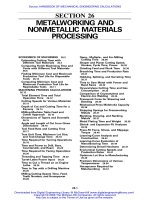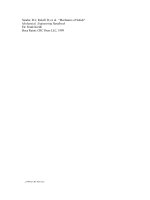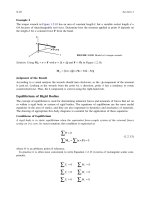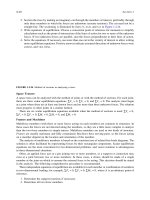CRC Press - Mechanical Engineering Handbook- Mechanics Of Solids Part 6 pot
Bạn đang xem bản rút gọn của tài liệu. Xem và tải ngay bản đầy đủ của tài liệu tại đây (30.76 KB, 1 trang )
1-50 Section 1
If a rigid body undergoes only translation,
(1.3.55)
If the rigid body undergoes pure rotation about the center of mass,
(1.3.56)
Rigid body motions are categorized according to the constraints of the motion:
1.Unconstrained Motion: Equations 1.3.54 are directly applied with all three equations independent
of one another.
2.Constrained Motion: Equations 1.3.54 are not independent of one another. Generally, a kinematics
analysis has to be made to determine how the motion is constrained in the plane. There are two
special cases:
a.Point constraint: the body has a fixed axis.
b.Line constraint: the body moves along a fixed line or plane.
When considering systems of rigid bodies, it is important to remember that at most only three equations
of motion are available from each free-body diagram for plane motion to solve for three unknowns. The
motion of interconnected bodies must be analyzed using related free-body diagrams.
Rotation about a Fixed Axis Not Through the Center of Mass
The methods presented above are essential in analyzing rigid bodies that rotate about a fixed axis, which
is common in machines (shafts, wheels, gears, linkages). The mass of the rotating body may be
nonuniformly distributed as modeled in Figure 1.3.18.
Note that r
C
is the nearest distance between the fixed axis O and the mass center C. The figure also
defines the normal and tangential coordinate system used in Equations 1.3.57, which are the scalar
equations of motion using normal and tangential components. The sum of the forces must include all
reaction forces on the rigid body at the axis of rotation.
(1.3.57)
General Plane Motion
A body that is translating and rotating is in general plane motion. The scalar equations of motion are
given by Equation 1.3.54. If an arbitrary axis A is used to find the resultant moment,
(1.3.58)
FIGURE 1.3.18Rotation of a rigid body about a fixed axis.
F ma F ma M
xC yC C
xy
∑∑∑
===0
FFMI
xyCC
∑∑∑
===00 α
Fmr Fmr MI
nC tC OO
∑∑∑
===ωαα
2
Mra
AA C
Im
∑
=+×α









